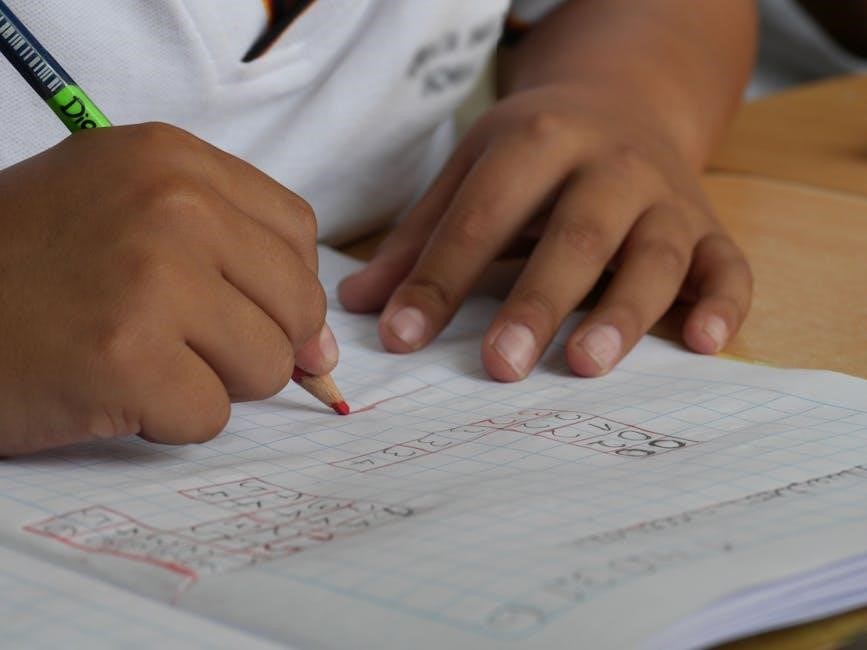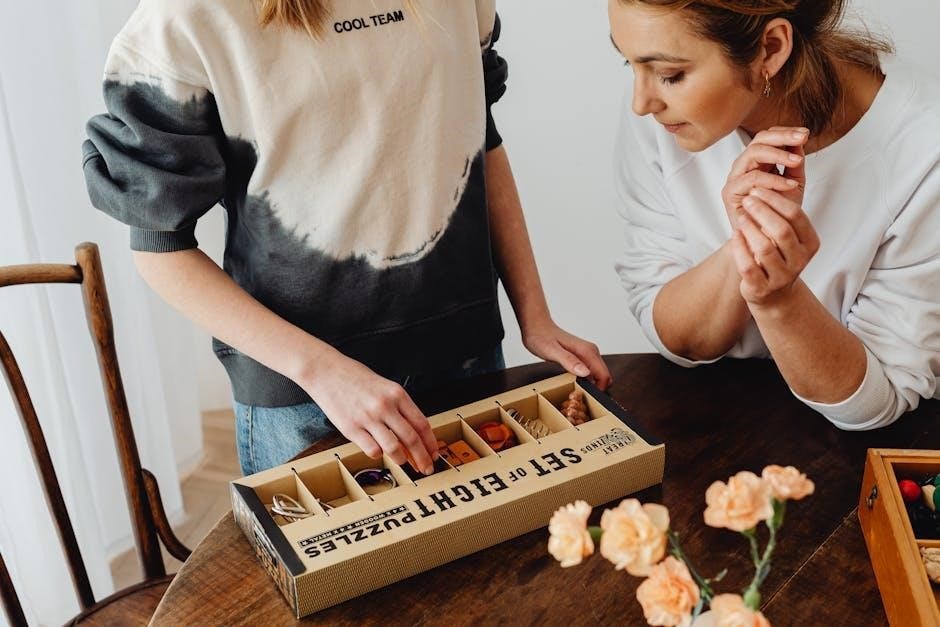social scenario problem solving task cards pdf
Social scenario problem-solving task cards are interactive tools designed to help individuals practice navigating real-life situations. They present diverse challenges, encouraging critical thinking and effective communication. These cards are visually engaging, making them ideal for educational and therapeutic settings. By focusing on practical scenarios, they foster skills like empathy and decision-making, preparing users for everyday interactions.
1;1 What Are Social Scenario Problem Solving Task Cards?
Social scenario problem-solving task cards are interactive tools designed to help individuals navigate real-life situations. They present diverse challenges, encouraging critical thinking, communication, and empathy. These cards typically include scenarios like running past a teacher or using humor appropriately, prompting users to reflect on appropriate responses. They are often color-coded for organization and used in classrooms or therapy to develop social and problem-solving skills. Their visual appeal and practical focus make them accessible for various learning needs.
1.2 Importance in Social Skills Development
Social scenario problem-solving task cards play a crucial role in developing essential social skills. They help individuals understand social nuances, interpret others’ emotions, and respond appropriately. By practicing real-life scenarios, users improve their ability to handle conflicts, communicate effectively, and demonstrate empathy. These tools are particularly valuable for fostering critical thinking and decision-making, enabling individuals to navigate complex social interactions with confidence. Their versatility makes them ideal for both educational and therapeutic settings, catering to diverse learning needs and promoting inclusive education.

Benefits of Using Task Cards
Task cards enhance critical thinking, improve communication, and foster empathy. They provide structured, engaging scenarios, making them versatile tools for social skills development in diverse educational settings.
2.1 Enhancing Critical Thinking Skills
Critical thinking is central to problem-solving, and task cards excel at fostering this skill. By presenting real-life scenarios, they encourage users to analyze situations, evaluate options, and predict outcomes. Each card challenges individuals to think deeply about social dynamics, helping them refine their ability to approach problems methodically. This structured practice not only sharpens analytical abilities but also builds confidence in decision-making. Over time, learners develop a stronger capacity to navigate complex social challenges with clarity and effectiveness, making task cards a valuable tool for cognitive growth.
2.2 Improving Communication Skills
Social scenario task cards are invaluable for enhancing communication skills, as they present real-life situations that require clear and effective expression. By discussing and role-playing these scenarios, individuals learn to articulate their thoughts, listen actively, and respond appropriately. The cards often involve humor, kindness, and conflict resolution, helping users understand social cues and adapt their communication style. This practical approach fosters confidence in expressing ideas and navigating interactions, making it easier to connect with others in various contexts.
2.3 Encouraging Empathy and Perspective Taking
Social scenario task cards excel at fostering empathy by presenting diverse perspectives and encouraging users to consider others’ feelings and viewpoints. Through role-playing and discussions, individuals learn to step into others’ shoes, understanding their emotions and motivations. These activities help users recognize the impact of their actions and develop compassion. By engaging with real-life challenges, they build the ability to navigate conflicts and interactions with sensitivity, fostering stronger, more empathetic relationships in their daily lives.
Designing Effective Task Cards
Effective task cards are clear, concise, and visually appealing, using real-life scenarios to engage users. They incorporate age-appropriate language and visuals to ensure accessibility and understanding.
3.1 Key Elements of a Well-Designed Task Card
A well-designed task card should include clear instructions, a relevant scenario, and open-ended questions to prompt critical thinking. Visual aids like images or diagrams can enhance understanding. The language should be age-appropriate, ensuring accessibility for all learners. Each card should focus on a specific skill, such as problem-solving or communication, and provide space for responses. The design should be visually appealing, with consistent formatting to maintain engagement. These elements work together to create an effective tool for practicing social scenarios in a structured and meaningful way.
3.2 Age-Appropriate Scenarios
Task cards should feature scenarios tailored to the age and developmental level of the user. For younger children, situations might involve sharing toys or resolving playground conflicts. Older students could tackle peer pressure or academic challenges. Scenarios should reflect real-life experiences, making them relatable and engaging. Age-appropriate language ensures clarity, while the complexity of problems aligns with cognitive abilities. This approach fosters meaningful practice and skill development, keeping learners motivated and focused on relevant social challenges.
3.3 Incorporating Visual Aids
Visual aids enhance task cards by making scenarios more relatable and engaging. Images, diagrams, or emojis can illustrate social situations, helping users visualize contexts. Color-coding or icons can categorize scenarios by difficulty or theme. For younger learners, pictures of facial expressions or settings aid understanding. Visuals also break down text-heavy content, making it accessible for diverse learners. This approach ensures clarity and engagement, fostering deeper comprehension and application of problem-solving skills in real-life interactions.

Implementing Task Cards in the Classroom
Teachers introduce task cards by discussing social issues, then distribute them for group discussions. Students think aloud, sharing problem-solving strategies, fostering engagement and critical thinking in real-time scenarios.
4.1 Strategies for Teachers
Teachers can effectively implement task cards by initiating class discussions on social issues, encouraging students to share examples. Distribute cards for group or individual use, prompting critical thinking. Encourage students to “think aloud” when solving problems, fostering engagement and insight. Provide guided feedback, helping students refine their strategies. These approaches create a dynamic, interactive learning environment, enhancing problem-solving and communication skills. Regular use of task cards ensures consistent practice, preparing students for real-world scenarios while promoting a deeper understanding of social dynamics and conflict resolution.
4.2 Integrating with Existing Curricula
Seamlessly integrate task cards into current lesson plans by aligning scenarios with curriculum goals; For example, use cards addressing friendship issues alongside social studies units on community. Incorporate them during language arts discussions on literature characters’ decisions. Task cards can also complement emotional intelligence programs, reinforcing concepts taught in class. This integration enriches learning experiences, making problem-solving skills relevant and applicable. By connecting task cards to existing content, educators ensure a cohesive and comprehensive approach to social skills development.
4.3 Assessing Student Progress
Regularly assess student progress by observing their participation in task card activities and reviewing their responses. Use observation checklists to track improvements in critical thinking and communication. Collect and review written answers to identify areas needing reinforcement. Provide constructive feedback to guide further learning. Track progress over time to measure growth in problem-solving abilities. This ongoing assessment helps tailor instruction, ensuring students receive targeted support and celebrate their achievements. Consistent evaluation fosters a clear understanding of each student’s developmental journey.

Using Task Cards in Therapy and Counseling
Social scenario task cards are effective tools in therapy, aiding speech therapists, cognitive behavioral therapists, and social skills groups. They help clients practice real-life interactions, fostering empathy and problem-solving. These cards provide structured exercises for individuals to explore appropriate responses and emotional regulation. Therapists can customize them to address specific needs, making them versatile for various therapeutic contexts and client populations.
5.1 Applications in Speech Therapy
Social scenario task cards are invaluable in speech therapy, helping clients practice conversations and understand social cues. They provide structured exercises to improve communication skills, such as initiating interactions, interpreting humor, and identifying emotions. The cards enable therapists to address specific speech goals, like articulation or pragmatics, in realistic contexts. By simulating everyday dialogues, they foster confidence and fluency, making them a versatile tool for enhancing verbal and non-verbal communication strategies. This approach also supports clients in developing self-awareness and effective expression of thoughts and feelings.
5.2 Role in Cognitive Behavioral Therapy
Social scenario task cards play a significant role in Cognitive Behavioral Therapy (CBT) by helping clients practice problem-solving and thought reframing. They present real-life situations that trigger specific emotional responses, allowing individuals to identify and challenge negative thought patterns. For example, a card might describe a social conflict, guiding the client to explore different reactions and outcomes. This tool aligns with CBT principles by encouraging rational thinking and adaptive behaviors. Therapists can use these cards to simulate challenges, fostering emotional regulation and resilience in a controlled environment. They are particularly effective for addressing social anxiety and interpersonal conflicts, promoting healthier coping strategies and self-awareness.
5.3 Supporting Social Skills Groups
Social scenario task cards are invaluable in social skills groups, offering structured, engaging activities that promote interaction and understanding. They provide real-life situations that encourage group members to discuss and role-play appropriate responses, fostering collaboration and empathy. Task cards help participants practice active listening, turn-taking, and conflict resolution, while also addressing specific challenges like initiating conversations or interpreting social cues. By facilitating shared problem-solving, these tools strengthen interpersonal connections and build confidence in navigating complex social dynamics, creating a supportive environment for skill development. They also allow therapists to tailor activities to group needs, ensuring relevance and effectiveness.
Creating a PDF Resource
Creating a PDF resource involves organizing task cards into a structured document. Include clear instructions, relevant scenarios, and visual aids for enhanced usability and accessibility.
6.1 Steps to Develop a PDF
Developing a PDF resource begins with planning and designing the layout. Start by selecting relevant social scenarios and organizing them logically. Use clear headings and concise instructions for each task card. Incorporate visual aids like images or icons to enhance engagement. Format the text for readability, ensuring proper spacing and font size. Review the content for accuracy and accessibility. Finally, save the document as a PDF and test its compatibility across devices. Ensure it is user-friendly and adaptable for different learning needs.
6.2 Design Tips for Visual Appeal
Ensure the PDF is visually appealing by using high-quality images and icons to complement scenarios. Choose a clean, readable font and consistent color scheme to enhance focus. Use bold headings and bullet points for clarity. Incorporate white space to avoid clutter and improve readability. Align text and images neatly, and consider adding borders or frames for a professional look. Use color coding to categorize scenarios, making it easier for users to navigate. Ensure the design is consistent throughout the document for a cohesive and engaging resource.
6.3 Ensuring Accessibility
To ensure accessibility, use clear, large fonts and high-contrast colors for readability. Include alt text for images and ensure compatibility with screen readers. Provide scalable text and avoid reliance on color alone for conveying information. Use simple language and organize content logically. Ensure the PDF is navigable via keyboard and includes bookmarks for easy navigation. Consider offering alternative formats, like text-only versions, to accommodate diverse needs. This ensures the resource is usable by everyone, including those with disabilities, aligning with accessibility standards for inclusive education and therapy settings.

Assessing Problem Solving Skills
Evaluate students’ approaches to social scenarios, focusing on critical thinking, creativity, and decision-making; Use task cards and observations to track progress and understanding of problem-solving strategies.
7.1 Evaluation Methods
Evaluation methods for problem-solving skills involve systematic approaches to assess how individuals process and resolve social scenarios. Task cards provide real-life situations, allowing educators to observe critical thinking and decision-making. Rubrics can be used to assess creativity, logical reasoning, and effective communication. Student reflections and self-assessments offer insights into their thought processes. Peer feedback and group discussions further enhance understanding. Progress tracking over time helps identify improvements, while constructive feedback guides further development.
7.2 Tracking Progress Over Time
Tracking progress over time involves consistently monitoring how individuals apply problem-solving skills to social scenarios. Regular use of task cards allows educators to observe improvements in critical thinking and decision-making; By reviewing responses and interactions, patterns in behavior and understanding can be identified. Progress tracking helps refine teaching strategies and ensure continuous development. Over time, students demonstrate increased confidence and effectiveness in navigating real-life challenges, showcasing the impact of consistent practice and feedback.
7.3 Providing Constructive Feedback
Providing constructive feedback is essential for helping individuals refine their problem-solving skills. When using task cards, educators and therapists should offer clear, specific insights into strengths and areas for improvement. Feedback should focus on the approach rather than the person, encouraging reflection and growth. For example, highlighting effective communication strategies or suggesting alternative solutions fosters learning. Regular, supportive feedback helps build confidence and improves decision-making abilities over time, ensuring individuals can apply these skills to real-life scenarios effectively.

Real-Life Applications of Learned Skills
Learned skills from task cards are applied in everyday situations, aiding peer conflict resolution and smoother family interactions through effective problem-solving strategies.
8;1 Applying Skills in Everyday Situations
Social scenario task cards equip individuals to navigate real-life challenges effectively. By practicing problem-solving strategies, users can apply these skills in school, home, or community settings. For instance, understanding appropriate humor or resolving conflicts mirrors everyday interactions, fostering confidence. These skills help reduce social anxiety and improve relationship dynamics, preparing individuals to handle diverse situations thoughtfully and responsibly.
8.2 Handling Peer Conflicts
Social scenario task cards provide practical tools for resolving peer conflicts. They simulate real-life disagreements, encouraging active listening and empathy. By analyzing situations, individuals develop strategies to remain calm and communicate clearly. These cards often include role-playing exercises, helping users practice respectful dialogue and compromise. Effective conflict resolution fosters stronger relationships and reduces misunderstandings, equipping individuals to navigate disagreements confidently and constructively in various social settings.
8.3 Navigating Family Interactions
Social scenario task cards help individuals navigate family interactions by presenting realistic situations that require problem-solving and emotional intelligence. These cards encourage users to consider different perspectives and develop respectful communication skills. By practicing active listening and understanding, individuals can address common family challenges, such as resolving disagreements or setting boundaries. The cards often include prompts that simulate real-life family dynamics, fostering empathy and collaboration. This prepares users to handle conflicts calmly and maintain harmonious relationships within their households, promoting a more supportive and understanding family environment.

Encouraging Independent Practice
Task cards promote independent practice by providing students with self-directed activities to solve social scenarios. This fosters problem-solving skills, self-confidence, and the ability to apply strategies independently.
9.1 Homework Assignments
Homework assignments using social scenario task cards provide students with opportunities to practice problem-solving independently. These activities are designed to reinforce classroom learning, encouraging students to apply critical thinking and communication skills in real-life situations. Assignments often include scenarios that require identifying appropriate responses, resolving conflicts, or demonstrating empathy. By completing these tasks at home, students develop self-confidence and the ability to navigate social challenges without direct supervision. Visual aids and clear instructions make the tasks engaging and accessible, ensuring students can work independently and effectively. This approach also allows parents to support their child’s learning process.
9.2 Self-Directed Learning
Social scenario task cards promote self-directed learning by enabling students to explore and practice problem-solving independently. These tools encourage critical thinking and decision-making through interactive scenarios. Students can work at their own pace, reflecting on appropriate responses and actions. The use of visual aids and clear instructions makes the tasks accessible for independent study. This approach fosters a deeper understanding of social dynamics and conflict resolution. By engaging with these cards, students develop confidence in navigating real-life situations, enhancing their ability to apply learned skills in everyday interactions.
9.3 Using Technology for Practice
Technology enhances social scenario practice through digital task cards and interactive platforms. Students can access scenarios via apps or online resources, promoting engagement and flexibility. Digital tools offer interactive elements, such as audio or video cues, to simulate real-life situations. This approach allows for self-paced learning and immediate feedback. Additionally, technology enables the creation of customizable task cards tailored to individual needs. By leveraging technology, students can practice social problem-solving skills anytime, anywhere, making learning more accessible and effective. This modern approach fosters independence and reinforces skill development in a dynamic way.

Aiding Differentiated Instruction
Social scenario task cards support differentiated instruction by offering customizable activities that cater to diverse learning needs, ensuring each student engages with relevant, challenging problems.
10.1 Catering to Diverse Learning Needs
Social scenario task cards are adaptable to meet the needs of diverse learners. They can be color-coded by difficulty or category, allowing teachers to tailor activities for individual students. For visual learners, task cards often include images or scenarios that make abstract concepts tangible. Tactile learners benefit from handling physical cards, while digital versions with QR codes offer interactive options. Teachers can further customize cards to address specific challenges, ensuring every student engages meaningfully. This flexibility supports inclusive education and helps bridge learning gaps in varied classroom settings.
10.2 Customizing Task Cards
Customizing task cards allows educators to tailor activities to specific student needs. Teachers can add images, adjust scenario complexity, or incorporate QR codes for interactive elements. Digital tools like Canva or Google Slides enable easy modification. For example, cards can be differentiated by adding visual aids for visual learners or simplifying language for younger students. Customization ensures relevance and engagement, making problem-solving skills accessible to all learners. This adaptability enhances the effectiveness of task cards in fostering social and critical thinking abilities across diverse student populations.
10.3 Supporting Inclusive Education
Social scenario problem-solving task cards are invaluable for fostering inclusive education. They provide diverse, relatable situations that cater to varied learning needs. By incorporating images, QR codes, and adjustable difficulty levels, educators can ensure accessibility for all students. Customizable scenarios accommodate different cultures, abilities, and experiences, promoting equity in learning. This adaptability allows every student to engage meaningfully, fostering a supportive environment where diverse perspectives are valued and included in the learning process.
Troubleshooting Common Challenges
11.1 Addressing Student Reluctance
Student reluctance can hinder the effectiveness of task cards. To address this, create a safe and non-judgmental environment where students feel comfortable sharing their thoughts. Encourage participation by using relatable scenarios and incorporating visual aids to break down complex situations. Offer positive reinforcement and gradual challenges to build confidence. Allow students to reflect on their responses and learn from peers, fostering a collaborative atmosphere. Providing clear instructions and modeling problem-solving strategies can also reduce hesitation and increase engagement with the task cards.
11.2 Managing Group Dynamics
Managing group dynamics is crucial when using task cards to ensure productive and respectful interactions. Encourage active participation by assigning roles like facilitator or recorder to balance contributions. Use task cards with scenarios that promote collaboration and empathy, helping students understand diverse perspectives. Address conflicts by teaching constructive communication skills, such as active listening and respectful disagreement. Rotate leadership roles to empower students and foster inclusivity. By creating a positive group culture, educators can maximize the learning benefits of social scenario problem-solving task cards and promote meaningful engagement among all participants.

Incorporating Feedback and Reflection
Incorporating feedback and reflection enhances learning by allowing students to analyze their problem-solving approaches. Use task cards to prompt self-reflection and peer discussions, fostering deeper understanding of social scenarios and strategies for improvement. Regular feedback sessions help students refine their skills and build confidence in navigating real-life challenges. Reflection activities, such as journals or group sharing, encourage students to articulate their thought processes and growth over time.
12.1 Student Reflection Activities
Student reflection activities are essential for deepening understanding and improving problem-solving skills. Encourage students to journal about their experiences with task cards, noting successes and challenges. Group discussions or sharing circles allow students to articulate their thought processes and learn from peers. Reflective exercises, such as “What would I do differently next time?” help students identify areas for growth. These activities foster self-awareness, critical thinking, and continuous improvement in navigating social scenarios. Regular reflection also enhances accountability and motivation, making learning more meaningful and impactful.
12.2 Peer Feedback Strategies
Peer feedback strategies foster collaboration and mutual understanding. Encourage students to share their thoughts on each other’s problem-solving approaches. This can be done through structured discussions or written comments. Use guidelines like specific, constructive, and actionable feedback to ensure positivity. Pair students to role-play scenarios, then discuss what worked well and what could be improved. This approach builds confidence, encourages empathy, and helps students refine their social skills. Regular peer feedback also promotes a supportive learning environment, enhancing overall problem-solving abilities and interpersonal communication.

Future Trends and Innovations
Digital and interactive task cards are emerging as innovative tools. Enhanced with AR/VR, they offer immersive learning experiences. Integration with educational technologies personalizes learning, making it engaging and accessible for diverse learners.
13.1 Digital and Interactive Task Cards
Digital task cards are revolutionizing social scenario problem-solving by offering interactive and immersive learning experiences. With animations, simulations, and real-time feedback, they engage learners dynamically. Integrating with platforms like Kahoot or Google Classroom enhances collaboration. Cloud-based accessibility ensures students can practice anytime, while analytics track progress. AI-driven adaptations personalize difficulty, catering to individual needs. These tools not only modernize education but also make social skills development more engaging and effective for diverse learners. They represent a future where technology seamlessly supports traditional teaching methods.
13.2 Integration with Educational Technology
Integrating social scenario task cards with educational technology enhances learning by leveraging platforms like Kahoot, Google Classroom, and learning management systems. Digital tools enable interactive discussions, real-time feedback, and collaborative problem-solving. Accessible on tablets and computers, these resources support hybrid learning environments. Teachers can track progress and differentiate instruction seamlessly. This integration bridges traditional methods with modern innovations, fostering engagement and inclusivity. It ensures that social skills development aligns with the evolving digital landscape, preparing students for future challenges in a tech-driven world.
Social scenario problem-solving task cards are versatile tools that foster critical thinking, communication, and empathy. By presenting real-life challenges, they help individuals navigate social interactions effectively. Their adaptability across educational and therapeutic settings makes them invaluable for diverse learners. These cards not only enhance problem-solving skills but also promote inclusivity and engagement. As education evolves, integrating these resources ensures learners are well-equipped to handle everyday situations confidently. Their impact extends beyond academics, contributing to personal growth and societal harmony, making them a cornerstone of modern educational practices.


